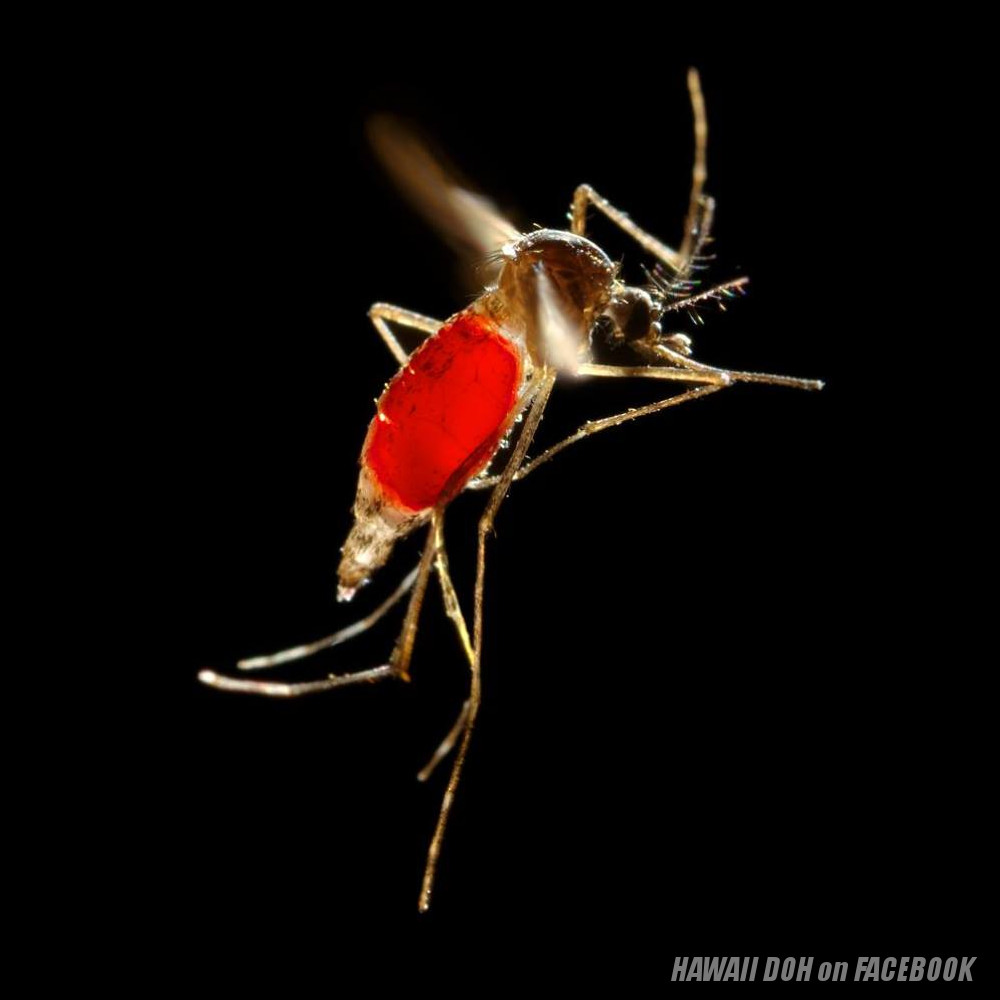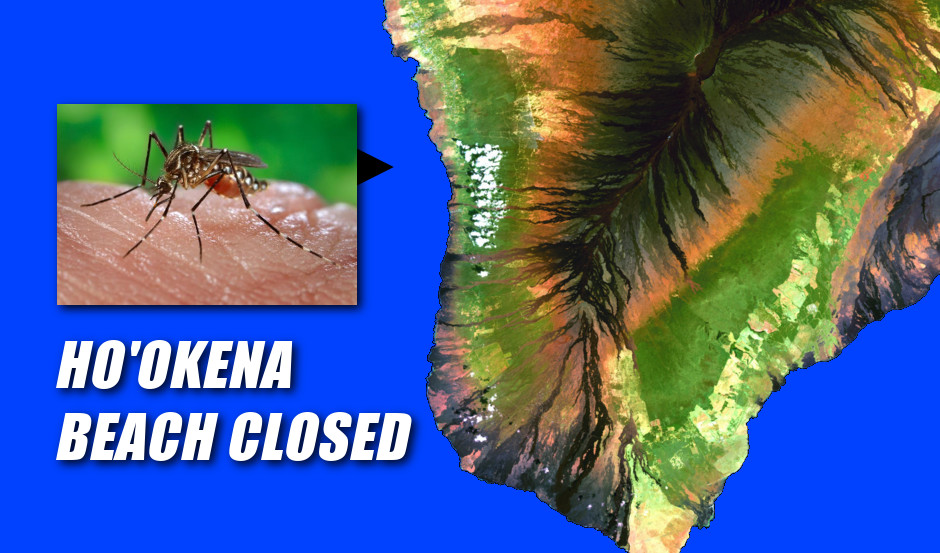
HAWAII – There are now 19 confirmed cases of dengue fever on Hawaii Island.
In a 1 p.m. update, the Hawaii Department of Health updated the numbers, and said 12 of those 19 cases involve Hawaii Island residents and 7 involve visitors.
“Dengue is not endemic in Hawaii,” stated the DOH update, “however it is intermittently imported from endemic areas by infected travelers. This is the first cluster of locally-acquired dengue fever since the 2011 outbreak on Oahu.”
The County of Hawaii took an active role in responding to the outbreak on Wednesday when it closed Ho’okena Beach park in South Kona in order to conduct mosquito control and pesticide treatments. The agency issued its first “Dengue Fever information update” yesterday.
There have been no confirmed cases at North Hawaii Community Hospital, according to a November 5 NHCH media release, but hospital personnel are on alert for possible exposure.

DENGUE FEVER
Frequently Asked Questions
November 2015Hawaii Island Outbreak
Where on the Big Island are the cases located?
The investigation is still underway, and the Department of Health (DOH) is still investigating possible areas where cases may have been exposed to infected mosquitoes. Regardless of where you are, it is a good idea to avoid mosquitoes and protect yourself from mosquito bites. (see “How can you keep from getting it?,” below)Could it spread to the other islands?
The risk of dengue spreading to other islands is low. The mosquitoes that are capable of spreading it are present statewide and cases of dengue have occurred in the past on other islands, although not frequently or recently. It’s important to keep the risk of dengue in Hawaii low. This is why, when we hear of suspect dengue cases (imported or otherwise), the department promptly does a thorough investigation to prevent further spread of disease.Do I have the symptoms of dengue?
If you are concerned that you may have symptoms related to dengue, you should contact your healthcare provider and avoid further exposure to mosquitoes. (see “What are the symptoms of dengue fever?,” below.)How many cases have there been?
The investigation is still ongoing. We are still actively seeking cases, following up on reported illnesses, and awaiting further testing by the U.S. Centers for Disease Control and Prevention (CDC), so the number of cases continues to change. Visit the DOH Disease Outbreak Control Division webpage “In the News” section for updates on the number of cases (http://health.hawaii.gov/docd/).Can I get mosquitoes tested for dengue? Can someone come and spray my property for mosquitoes?
Mosquito testing for individuals is not something that the DOH is able to offer. Department staff have been conducting on-going assessments for mosquito activity and may as a precaution be spraying in areas; DOH necessarily is prioritizing areas of concern identified through our investigations. However, all individuals can help in reducing risk from mosquitoes around their homes (see “What steps should be taken to reduce mosquito nuisance at home?,” below.) Individuals or businesses who wish to have their property sprayed against mosquitoes may opt to use private pest control services.Can I get tested for dengue?
If you are at all concerned that you might have dengue, you should contact your healthcare provider and avoid further exposure to mosquitoes.What is being done to stop it from spreading?
DOH is actively conducting an investigation into identified cases, as well as working to identify additional cases and evaluate for on-going transmission of disease. Department staff are also conducting assessments of areas of concern for the presence of mosquitoes and may as a precaution spray areas specifically related to our ongoing investigation.Who do I contact with other questions about dengue fever?
Individuals may call Aloha United Way’s 2-1-1 for more information about dengue fever and the recent Big Island dengue investigation. To report a suspect case, contact the DOH Disease Outbreak Control Division at 808-586-4586. If you are ill and are worried that you might have dengue fever, contact your healthcare provider.General Questions
What is dengue fever?
Dengue fever is a viral illness spread by mosquitoes. The disease occurs mainly in tropical Asia, Africa, the Caribbean and the South Pacific. It is most common during the rainy season in areas infested with infected mosquitoes. Sometimes, persons arriving from other countries may enter the United States with dengue fever and infect local mosquitoes, as happened in Hawaii in 2001 and 2011.How do you get it?
The dengue virus is spread through the bite of infected Aedes mosquitoes. Dengue is not commonly spread directly from one person to another.What are the symptoms of dengue fever?
The symptoms of dengue fever include sudden onset of fever, severe headaches, eye, joint, and muscle pain, and rash. The rash typically appears on the hands, arms, legs and feet 3 to 4 days after the fever begins. Minor bleeding problems can also occur. The symptoms usually go away completely within 1 to 2 weeks. Sometimes, people with dengue fever have blood clotting problems. When this happens, the illness is called severe dengue. Severe dengue is a very serious illness with abnormal bleeding and very low blood pressure (shock).When do symptoms start?
The symptoms usually start 5 to 7 days after being bitten by infected mosquitoes, but the onset can range from 3 – 10 days.What is the treatment for dengue fever?
There is no specific treatment for dengue fever. Bed rest and acetaminophen (Tylenol) to treat fever and pain are recommended. Aspirin and NSAIDS (ibuprofen, naproxen) are not recommended as they can make bleeding problems worse. There is currently no vaccine for dengue fever. Individuals with dengue should seek out medical care.If you get dengue fever once, can you get it again?
Yes. There are four major types of dengue viruses. Having dengue fever with one type of dengue virus will not protect you from the other three types.How can you keep from getting it?
• When traveling to areas that have dengue fever, try to avoid exposure to mosquitoes. Aedes mosquitoes are usually most active in the early morning hours after daybreak, in the late afternoon before dark, and any time during the day when indoors or in shady areas.
• Use mosquito netting over beds, and screens on windows and doorways.
• Use mosquito repellents with 20-30% DEET and wear appropriate clothing such as longsleeved shirts and long pants that reduce exposure to mosquito bites.
• Mosquitoes are drawn to dark colors; so if possible, wear white or light colored clothing when you are likely to be exposed to biting mosquitoes.MOSQUITOES
Are all mosquitoes alike?
No. Mosquitoes have been around for millions of years. In that time, they’ve diversified into about 3,000 species worldwide. They have successfully adapted to climates from the arctic to the tropics. Some mosquitoes bite humans while others prefer other animals and some even just sip plant nectar; some transmit diseases, while others do not; some are active during the day, others at night; some prefer to breed in clean water, others in dirty ponds and swamps.Do all mosquitoes bite?
No. Only the females bite. Female mosquitoes require the protein of a blood meal for development of their eggs – they do not feed on blood for their own nourishment. Since blood is only required to build eggs, the males do not take blood, but rather feed on plant nectar.What are common mosquito breeding sites to watch for?
Intolerable mosquito nuisance usually indicates a nearby breeding source. Make a systematic and thorough inspection around your home. Common breeding sites are in water found in old tires, clogged roof gutters, cans, bottles, unused swimming pools, unused fish ponds, pineapple lilies (bromeliads), hollow bamboo stumps, hollow tree stumps, uncapped hollow tile walls, uncapped fence pipes, and overflow trays under house plants.What steps should be taken to reduce mosquito nuisance at home?
• Remove or empty anything that catches or holds standing water, such as old tires, flowerpots, toys, buckets, and plastic tarps on your premises.
• For plants that hold water, flush with a hose or spray with soapy water once a week.
• Use mosquito-eating fish, such as guppies, in fish ponds, unused swimming pools, or other large containers that cannot be removed or emptied of standing water.
• Install or repair window screens and doors to keep out mosquitoes. Screens are your best protection against mosquito nuisance in your home.
• Clean your gutters. Remove leaves and debris so water will drain freely.What steps can be taken for immediate temporary control?
• Eliminate adult mosquitoes with aerosol insecticide labeled for flying insects.
• Use insecticides specifically labeled for controlling mosquito larvae in breeding sites that cannot be emptied or removed. Consult your garden shop or a chemical company for available insecticides.
• Carefully follow the insecticide label’s instructions for useCAUTION: Certain pesticides and their solvents may cause respiratory irritation. Persons with respiratory diseases should consult their physicians before using any pesticide. It is a violation of federal law if pesticides are not applied exactly as the label directs. Insecticides can be harmful to people, pets, wildlife, and the environment when used improperly.
What are guidelines for using a repellent on children?
Always follow the recommendations appearing on the product label when using repellent:• Repellants containing DEET should not be used on infants less than 2 months old, and certain other repellants may not be appropriate for young children (e.g. oil of lemon eucalyptus should not be used in children less than age 3 years).
• When using repellent on a child, apply it to your own hands and then rub them on your child. Avoid children’s eyes and mouth and use it sparingly around their ears. After returning indoors, wash treated skin with soap and water.
• Do not apply repellent to children’s hands. (Children may tend to put their hands in their mouths.)
• Do not allow young children to apply insect repellent to themselves; have an adult do it for them.
• Keep repellents out of reach of children.
• Do not apply repellent under clothing. If repellent is applied to clothing, wash treated clothing before wearing again. (May vary by product, check label for specific instructions)
• Follow instructions – using more won’t give you extra protection but may increase riskHow else can I protect children from mosquito bites?
Children (and adults) can wear clothing with long pants and long sleeves while outdoors. DEET or other repellents such as permethrin can also be applied to clothing (but is not registered for use on skin), as mosquitoes may bite through thin fabric. Mosquito netting can be used over infant carriers. Also, try to reduce the number of mosquitoes in the area by getting rid of containers with standing water that provide breeding places for mosquitoes.Can insect repellents be used by pregnant or nursing women?
Other than the routine precautions noted earlier, EPA does not recommend any additional precautions for using registered repellents on pregnant or lactating women. Consult your health care provider if you have questions.USING REPELLENTS SAFELY
CAUTION: Always read the entire label before you use insect repellent and apply exactly as the label directs.Why should I use insect repellent?
Insect repellents can help reduce exposure to mosquito bites that may carry viruses such as Dengue fever or West Nile virus that can cause serious illness and even death. Using insect repellent allows you to continue to play and work outdoors with a reduced risk of mosquito bites.When should I use mosquito repellent?
Apply repellent when you are going to be outdoors. Even if you don’t notice mosquitoes there is a good chance that they are around.How often should repellent be reapplied?
In general you should re-apply repellent if you are being bitten by mosquitoes. Always follow the directions on the product you are using. Sweating, perspiration or getting wet may mean that you need to re-apply repellent more frequently. Repellents containing a higher concentration (higher percentage) of active ingredient typically provide longerlasting protection.Which mosquito repellents work best?
CDC recommends using products that have been shown to work in scientific trials and that contain active ingredients which have been registered with the US Environmental Protection Agency (EPA) for use as insect repellents on skin or clothing. Of the active ingredients registered with the EPA, CDC believes that two have demonstrated a higher degree of efficacy in the peer-reviewed, scientific literature.Products containing these active ingredients typically provide longer-lasting protection than others:
• DEET (N,N-diethyl-m-toluamide)
• Picaridin (KBR 3023)Oil of lemon eucalyptus [active ingredient: p-menthane 3,8-diol (PMD)], a plant- based repellent, is also registered with EPA. In two recent scientific publications, when oil of lemon eucalyptus was tested against mosquitoes found in the US it provided protection similar to repellents with low concentrations of DEET.
What are some general considerations to remember when using insect repellents?
Always follow the recommendations appearing on the product label.• Use enough repellent to cover exposed skin or clothing. Don’t apply repellent to skin that is under clothing. Heavy application is not necessary to achieve protection.
• Do not apply repellent to cuts, wounds, or irritated skin.
• After returning indoors, wash treated skin with soap and water. (This may vary depending on the product. Check the label.)
• Do not spray aerosol or pump products in enclosed areas.
• Do not spray aerosol or pump products directly to your face. Spray your hands and then rub them carefully over the face, avoiding eyes and mouth.What are some reactions to be aware of when using insect repellents?
Use of repellents products may cause skin reactions in rare cases. Most products also note that eye irritation can occur if product gets in the eye. If you suspect a reaction to a product, discontinue use, wash the treated skin, and call a poison control center. If product gets in the eyes flush with water and consult health care provider or poison control center. If you go to a doctor, take the product with you. There is a national number to reach a Poison Control Center near you: 1-800-222-1222.Where can I get more information about repellents?
For more information about using repellents, please consult the Environmental Protection Agency (EPA) Web site or consult the National Pesticide Information Center (NPIC), which is cooperatively sponsored by Oregon State University and the U.S. EPA. NPIC can be reached at: npic.orst.edu or 1-800-858-7378.


by Big Island Video News1:30 pm
on at
STORY SUMMARY
HAWAII – There are now 19 confirmed cases of dengue fever on Hawaii Island. In a 1 p.m. update, the Hawaii Department of Health updated the numbers, and said 12 of those 19 cases involve Hawaii Island residents and 7 involve visitors. “Dengue is not endemic in Hawaii,” stated the DOH update, “however it is […]